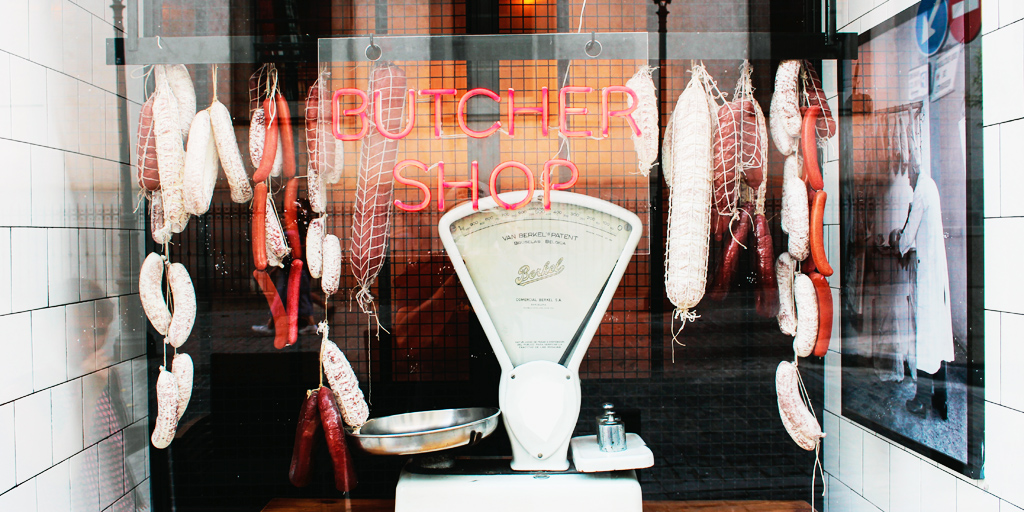Butcher careers guide and job profile

It’s a great time to become a young butcher because everyone wants your skills! There are plenty of butcher apprenticeships available…
Butcher careers: What’s involved
You might never have thought about a butcher job before, but actually being a butcher is a career choice that’s alive and kicking because there’s currently a national shortage of people with the right skills. You could work in retail in an independent butcher’s shop or supermarket chain. You could also work with a meat wholesaler, preparing and storing meat before it’s sent on to retailers and customers like hotels and restaurants.
Finally, you could work with the Meat Hygiene Service to check standards in meat plants and abattoirs once you’re a qualified butcher. It’s a current fact of life that many people eat meat. For as long as we eat meat as a society, the treatment of the animals and the meat they provide needs to be done right.
How Much Money Can You Earn As a Butcher?
These LMI Job Trends give you a sneak peek of how much you could earn starting out for this career, and how much your salary could grow with experience.
Salary guide for butcher jobs
Recent labour market information says you can earn on average between £12,500 and £30,000 a year as a butcher in the UK.
Your starting salary can vary because of factors like level of experience, training, location or the size of the company. Your salary will increase over time as you build skills, knowledge and experience.
Green Careers and Animal / Environmental Careers FAQs
Is there something you’d like to know about environmental careers?
- DID YOU KNOW? You can get into these careers with T Levels!
- 5 tips on getting environmental jobs
- Green careers with the Environment Agency
- What are the UK’s best-paid environmental jobs?
- 5 reasons to explore ABP food industry careers
- You can get health & safety apprenticeships that help you study for a FREE degree!
- Nature volunteering can help your confidence and CV
Skills you need to become a butcher
Useful skills to put in your CV for butcher jobs:
- Great communication skills – (for friendly and knowledgeable customer service)
- Maths skills (for pricing meat and weighing it as needed)
- Steady hands (you’ll be doing precision work with knives and other equipment)
How do you get these skills?
Vocational qualifications and work experience will help you build these skills over time.
Build Your Skills With the FREE Young Professional Programme

What Qualifications & Training Do You Need For Butcher Careers?
School, College And Training
You don’t need any formal qualifications to become a butcher, but having a certain level or numeracy and language skills may help you get hired by employers (who may set aptitude tests as part of their recruitment process). With this in mind, it’s useful to have GCSEs in grades 9-4 (A*-C) in English, maths and a science subject.
To progress more speedily in your career, you can study for relevant qualifications.
Example butchery qualifications to study for:
- Level 2 diploma for proficiency in meat & poultry industry skills
- Level 3 certificate for proficiency in meat and poultry industry skills
- Intermediate Certificate in Meat and Poultry (or Meat and Poultry Management)
While at school or college, speak to your careers advisor about useful training and/or courses for you to take and find out more about the types of career routes available.
Progressing your career
With time and experience you could have the opportunity for career options like progressing to supervisor or manager roles, especially in supermarkets and chains. You could also build your career by working in larger and more prestigious independent butchers’ shops, like the ones where their meat gets a royal seal of approval.
You could also become self-employed and set up your own shop, or move into catering, meat manufacturing and wholesaling.
Who Can Help?
Many professional bodies also offer a range of training opportunities, including activities that count towards continuing professional development (CPD). Find out more below:
- ABP offer butcher apprenticeships and early careers in the meat industry.
- Tasty Careers offer early career insights and support for getting into the food industry.
- The Institute of Meat – The Institute of Meat (IoM) is a professional body for people from the meat industry and related fields of activity. They encourage and help to fund education and training throughout the industry
Butcher Apprenticeships
Many young butchers get started in this career through a training or apprenticeship scheme. You’ll typically get structured training while you work and earn, and industry-recognised qualifications.
You’ll find all kinds of butcher apprenticeships available from a wide variety of providers.
With a Level 2 Butcher Apprenticeship you can expect to pick up core skills and knowledge like:
- The principles of butchery, including selection, welfare and handling of livestock, and slaughter practices including Halal and Kosher
- The principles of minimising waste, maximising yield and predicting how to cost meat as a result
- Knife handling skills including cutting, boning, trimming and mincing of meat (including the use of equipment)
- Stock control, product pricing, quality assurance and delivering what customers and contractors expect
- Health and food safety, including hygiene in a food production environment
For an Advanced Butcher Apprenticeship, you may also expect to cover:
- A deeper understanding of good practice and health and safety policy
- Managing the food safety and hygiene process, including disinfection of equipment
- The end to end process for red and white meat selection and preparation
- The range of methods for chilling, maturing, handing and storing meat
Once you are ready, the GOV.UK Find an Apprenticeship service can help you to find suitable positions.
What Work Experience Do You Need For Butcher Jobs?
Work Experience Tips
Work experience is very useful for this role.
You’ll typically start out as a trainee or assistant and learn on the job, potentially doing structured training at the same time through an apprenticeship.
- Get practising with YouTube cookery videos showing you how to use and prepare different cuts of meat for recipes.
- Talk to your local butcher about using different cuts of meat – they have lots of knowledge and will be happy to share it if you’re not holding up the queue.
What Does A Butcher Do?
You’ll be feeding your local community and learning about a wide variety of meat – and what people can do with it to save money and eat delicious food at home. There can also be some creativity involved as you progress in your career.
Deliveries often arrive early in the morning so you could have an early start to the day. In large supermarkets there will usually be a shift system so while you might need to sometimes work overtime or on evenings and weekends, this need not be the case all the time.
If you become a qualified independent butcher you can get to create new and interesting food, experimenting with cuts, spices and sauces. Think of how many varieties of sausage there are out there, from spicy chipolatas to pork sausages with apple and stuffing.
You could even become something of a local celebrity, showcasing your skills at local festivals.
Example daily job responsibilities
- Buying and storing stock
- Checking deliveries for their content and hygiene
- Transporting meat to cold storage areas like walk-in freezers
- Cutting, boning and trimming meat
- Giving great customer service when it comes to serving meat and also giving advice on how to prepare and cook it
- Creating attractive product displays
- Travelling to markets and wholesales to pick up and deliver stock and products.
Catering & Hospitality Career FAQs

What would you like to know about catering & hospitality careers? Maybe we can help!
How To Find Butcher Jobs: Next Steps
To find jobs for young people in this role, search on job boards for jobs with these words like these in the title:
- Apprentice butcher
- Trainee butcher
- Assistant butcher
- Part-time butcher
These Youth Friendly Employers offer great opportunities
These Youth-Friendly Employers might be able to help you get great hospitality jobs, training or experience! Take a look.
Catering & Hospitality Career Tips & Opportunities
Catering & Hospitality Career Guides
View job descriptions with average UK salary, useful qualifications and a variety of routes into this career.
See All Our Youth-Friendly Employers

























Agriculture, Animal & Environment Career Tips & Opportunities
Have You Thought About These Agriculture, Animal & Environment Careers?
View job descriptions with average UK salary, useful qualifications and a wide range of routes into each career.
YES! I Want More Free Careers Help...
So what are you waiting for? Grab your future.












































